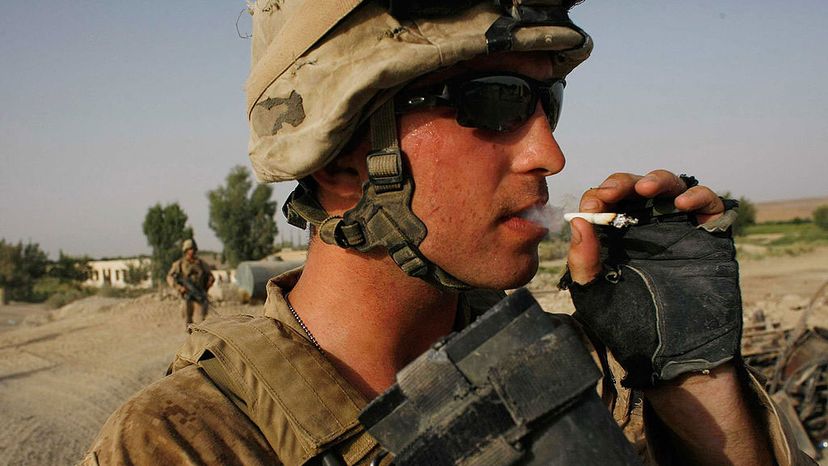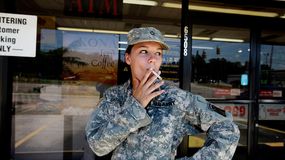
Members of the United States military smoke at above-average rates, according to a Department of Defense report. 2011 numbers showed that 24 percent of active duty personnel were smokers compared with 19 percent of civilians. And 38 percent of the servicemen and women who smoke picked up the habit after enlisting.
Worse, Big Tobacco deliberately targeted young servicemen and women. This finding is part of the Truth Initiative's recent campaign about Big Tobacco and the military. The nonprofit, which is dedicated to smoking cessation among youth and young adults, consulted a searchable database maintained by the University of California, San Francisco, which contains tobacco industry documents made public as evidence in litigation. Within the documents, they found references to members of the U.S. military as "the plums that are here to be plucked," and discovered that tobacco companies considered the group high potential because they are "less educated" and have "limited job prospects," among other traits.
Advertisement
"They really saw this as a growth market for their product," explains Truth Initiative Chief Operating Officer Dave Dobbins. "Then we figured out that they gave away samples in the past to the military, used military people in ads, held special events on bases. Those roots in the military culture continue to blossom today."
Dobbins says that the seeds were sowed long ago, likening it to how professional baseball players continue to chew tobacco at higher rates than the general population. "In the early days of baseball tobacco really supported baseball. In fact, the first baseball cards were in tobacco packages." Dobbins says. "If you can sufficiently engrain yourself your customers will do the work for you, so you don't have to do the advertising. It's old school viral marketing."
Indeed, Mike Jenkins, who spent 1968-1971 as a member of the U.S. Navy recalls rampant cigarette use. "I was in the Navy on nuclear submarines submerged for more than two months at a time, and a carton (10 packs holding 200 cigarettes) cost only $1.05. Nearly everyone smoked because it was cheap and helped pass the time," he says in an email interview. As late as the 1970s, the military distributed cigarette rations to service members, as they were thought to have a calming effect on them and helped stave off boredom.
Greg Cope White is among the 38 percent who start smoking after enlisting. He joined the Marines in 1980 and served six years. "I started when I was in my regular unit. Mostly out of boredom and because a couple of my friends smoked. We got to hang out more," says the author of "The Pink Marine" in an email interview. He quit after he got out of the service. "I was worried about the long-term effects. I knew it was unhealthy. Plus, I was dating and the smell was offensive to most. Few civilians I knew smoked."
That peer influence is a big reason for the prevalence of smoking in the military, says Paul Fitzpatrick, program manager of the Quit Tobacco-UCanQuit2 initiative at the Defense Health Agency, which provides health services to the U.S military. "Young men and women away from home for the first time seek bonding with [a] new social group. Smoking offers a common bond with otherwise a very geographical, racial, social economic group (new military recruits)," he emails, referencing a 2008 study on cigarette smoking in the Air Force, the only empirical research study conducted on tobacco use in military training. (Smoking is not allowed during boot camp but is allowed afterward.)

"Tobacco use rates in the military have decreased slightly since 2009 but not significantly. Therefore, there's strong indication that the data assessed in this study are likely still valid today," says Fitzpatrick.
Smoking costs the Department of Defense over $1.6 billion per year, taking into account tobacco-related hospitalization, medical care and lost workdays, and the agency is taking steps to reduce the habit. Its health insurance company, TRICARE, now offers coverage for smoking cessation services. Tobacco companies can no longer hand out branded swag or sponsor events on bases. And the Navy restricts tobacco sales on its base commissaries, says Fitzpatrick.
In 2016, former Defense Secretary Ash Carter issued policy guidelines designed to discourage smoking in the military. These included a rule that tobacco products sold on bases must cost the same as those sold in nearby retails outlets and that the services should create policies to limit or eliminate tobacco use in base housing.
"I'm not here to criticize the Department of Defense or the branches," Dobbins of the Truth Initiative says. "I'm more trying to look at the culture of smoking, but the facts are obvious. Less smoking would help readiness, reduce hospitalization and reduce diseases just like in the civilian population."
Advertisement


